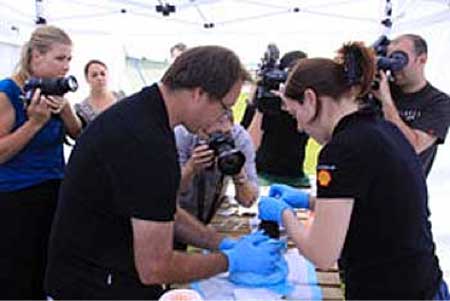Wildlife Centre steps up oil spill response

Massey University’s wildlife centre at the Manawatu campus is being temporarily closed from tomorrow so staff can attend to stricken animals caught up in the oil spill off the Tauranga coastline.
Wildlife centre director Dr Brett Gartrell says two staff would stay until then to release animals back to their homes.
For the past week staff have been seconded to the Oiled Wildlife Response Centre, following the grounding of the container ship Rena.
More than 50 birds have already been retrieved from the oil slicked shoreline as staff, led by wildlife veterinarians Kerri Morgan and Helen McConnell, work long days in a bid to clean birds and restore them back to full health.
A wildlife specialist from the University of Davis, California, is also arriving to help with recovery efforts.
Five New Zealand dotterel were removed from their habitat by the centre’s field recovery staff in a pre-emptive effort to save as many of the endangered species before the oil reached them. The centre has up to 36 teams of staff working on field recovery. This includes veterinarians who have been sporadically located on surrounding islands off the shoreline to help affected wildlife immediately before the animals are transported back to the Te Maunga-based centre on the harbour side of Mt Maunganui.
So far, petrels, shags and five seals have been brought to the centre and washed daily to remove oil. The cleaned birds swim in pools to regain their waterproofing. They are being fed with a warm saline solution containing glucose and an antifungal for respiratory problems, followed by a fish slurry consisting of whole salmon, fluids, vitamins and salt.
The centre is now ready to accommodate up to 500 birds, with capacity to take more as the numbers of oiled animals is expected to escalate in coming days as oil continues to wash ashore.
Some 500 dead birds have also been recovered from beaches, with a wildlife pathologist currently collating their number, variety of species and cause of death.
Dr Gartrell says the experience wildlife centre staff gained earlier this year from dealing with an influx of broad-billed prions was coming in handy in Tauranga. In July, more than 600 prions were brought to the wildlife centre after strong winds blew them off course and on to land.
Other University veterinary staff in Tauranga include Baukje Lenting, Sarah Michael and Pauline Conayne. Communications adviser Bryan Gibson is assisting them and Maritime New Zealand with the national and international media interest. The University is contracted by Maritime New Zealand to provide the oiled wildlife response to any environmental disaster.
Meanwhile, Massey University’s Joint Centre for Disaster Research director Dr David Johnston says that aside from the obvious ecological and economic impact of the oil spill, the disaster had a psychological effect too on the surrounding community.
“There’s often this initial focus on the technological response dealing with the ecological impacts, but many of these community issues are often overlooked or underestimated to the extent they will impact on the community now and in the future,” he says.
It differed from a natural disaster like the Christchurch earthquakes, with the public less inclined to be forgiving of a man-made disaster.
“In this case it was human error, so there’s frustration, there’s someone to direct that anger at, there’s issues of liability, people want fairness, they want compensation they want someone to be held accountable for this. This is different from what we see in natural disasters and I think it’s an important difference that needs to be worked through with the community.”